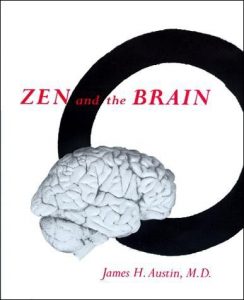This morning I did my first 60-minute meditation session. I’d was listening to Naval Ravicant on Joe Rogan’s podcast a few weeks ago and he made a challenge for listeners to do 60 minutes for 60 days, and it’s stuck with me since I first heard it. I don’t know when I first started meditating, but I can say with certainty that I started making it a habit back in November, and I’ve been doing it almost every day since then.
 Back in the late 90s I bought a copy of Zen and the Brain, by neuroscientist and Zen practitioner David Austin. I was a bit of neurobiology nerd back in high school when I was taking AP biology, and started becoming interested in how the brain and consciousness works. This was probably following my first acid trip. The book described the work of comparative studies between the brain images of Buddhist monks and people who did not practice meditation. There were notable differences in the size of certain areas of the brain, as well as the brain activity of the monks when they were practicing their meditative state. I don’t recall trying to meditate myself. There was always debates about how long was effective — David Lynch was quoted somewhere that he felt the minimum effective dose was somewhere around 45 minutes, 20 was too little.
Back in the late 90s I bought a copy of Zen and the Brain, by neuroscientist and Zen practitioner David Austin. I was a bit of neurobiology nerd back in high school when I was taking AP biology, and started becoming interested in how the brain and consciousness works. This was probably following my first acid trip. The book described the work of comparative studies between the brain images of Buddhist monks and people who did not practice meditation. There were notable differences in the size of certain areas of the brain, as well as the brain activity of the monks when they were practicing their meditative state. I don’t recall trying to meditate myself. There was always debates about how long was effective — David Lynch was quoted somewhere that he felt the minimum effective dose was somewhere around 45 minutes, 20 was too little.
I tried some stints over the past few years. I recall doing a couple 45 minute sessions at some point, but it never stuck. I never really liked the guided meditations. And the apps with the cricket or forest backgrounds got too distracting when I started to notice the loops. It wasn’t until I started Sam Harris’s Waking Up app that it became a regular habit. The 10-minute sessions were short enough that I didn’t have any excuses not to do it. They were interesting enough, and Harris’s secular approach clicked with me, as well as his promise that one could arrive instantaneously to the place where the illusion of the self was apparent. Not that one would necessarily stay there for very long, of course, but that it was as fast as the sound of him snapping his finger.
That was enough to get me going, and it was apparent over the first few weeks that something was happening. It’s subtle, but effective, and about a month ago I decided that I didn’t want the guided meditations anymore, and decided to go from 10 to 30 minutes on a simple timer. I’ve been getting up at 5 or 6 in the morning, and going outside, weather permitting, and sitting quietly on a cushion. A week or two ago, after talking myself into Naval’s challenge, I started ramping up by a minute or two each day, then to 45 yesterday and 60 this morning. I told my wife this morning, and she asked me how I felt. I shrugged my shoulders, cause there wasn’t really anything to say about it. It’s not really about feeling a certain way, but it’s about making changes in your brain so that you’re different when you’re not meditating.
 I’ve tried to get my kids to start the habit. We’ve got a couple of children’s books about the subject, one called Moody Cow, and another about a dog that chases his tail. Sam Harris’s wife Annica has some guided meditations for children, I was able to get them down for a 5-minute breath exercise one or two times. But the best thing I think is for them to see me doing it, and hopefully they’ll start to emulate it on their own, the way they do when I’m exercising at the house.
I’ve tried to get my kids to start the habit. We’ve got a couple of children’s books about the subject, one called Moody Cow, and another about a dog that chases his tail. Sam Harris’s wife Annica has some guided meditations for children, I was able to get them down for a 5-minute breath exercise one or two times. But the best thing I think is for them to see me doing it, and hopefully they’ll start to emulate it on their own, the way they do when I’m exercising at the house.
I’m probably not the best advocate for meditation here. I haven’t really tried making a case to people about it, or any far out claims about vast improvements in my mental state or well-being. I think the research speaks clearly enough, and anyways, I’m not trying to convince or impress anyone about it. Like fasting, it’s something I think that has been practiced for thousands of years, and is something that we’ve lost track of in our modern lives. Taking a step back for a few minutes a day, whether it’s 5 minutes, or more, is something that has helped quiet my mind, and help me focus more, to be present with my family, and to strengthen a sort of meta-cognition about the thought processes going on in my own head, as well as the stories that I tell myself, about myself and the world inside my head.
And being aware of those stories and those voices, and being able to watch them fade away and just be present in the moment, that is what I’ve learned most so far.